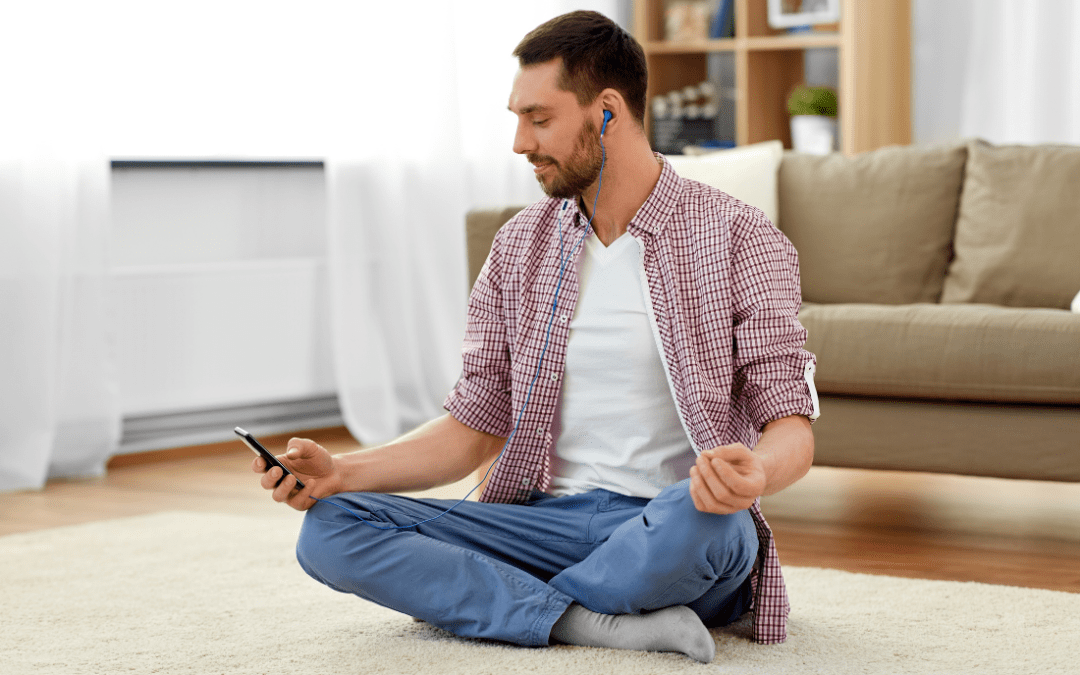Author: Neil McCarthy
Life experiences, including a regular meditation practice, have shown me that all life predicaments and mental states will pass in time. But more than just meditation has seen me through tough times; music has served as a constant, lifelong companion.
Over the past eight years or so, meditation has provided relief from the mental states that used to grip me, and music has allowed me to express my emotions in a safe environment. Made possible by medication and therapy, I can watch thoughts float by with amusement while sitting quietly.
My love of music dates back to childhood. Pictures of me in headphones too large for my eight-year-old head bring up memories of listening to family records such as the Beatles’ White Album or the Moody Blues. Nowadays, I might sometimes stream music, but I like to play CDs I have not heard since my teenage years and hum right along. Memories of these songs seem engraved in my psyche, perhaps because they predated my first manic episode. Remembrances of that work email from yesterday escape me, but the chorus to a tune I have not heard since 1995 does not.
As a teenager, I would cope with a breakup by cranking music up in my headphones. Throughout my life, I have frequented live music venues and, with delight, soaked in the sights of colorful hair, full arm tattoos, and creative piercings.
Of late, I combine a meditation practice with my love of music. Live shows inspire me to let my thoughts drop into the background so I can mesh with the sights and sounds of the event. Writing, playing, and mixing music can happen naturally when I approach the activities with a meditative mind. The creative ideas spill out of my instruments and into the mixing software while anxieties and doubts slide into the background, becoming just quiet commentary on the task at hand.
Meditation has given me the strength to work through life’s tough spots. Raising a family and keeping up at a job can present many obstacles for anyone, but adding a bipolar to the mix increases the intensity of everyday life. I have lost many jobs, but after my most recent loss, I stuck to a strict meditation practice to look for clarity. The practice took the sting out of the loss, plus it improved focus in my job search and confidence at interviews. Without self-critical thoughts nagging at me, conversation during an interview could flow with ease.
Recovery has taught me how to take care of myself, with meditation and music forming an important piece of the puzzle known as healing. In healing, I have learned the importance of not taking life so seriously. When I become attached to my moods and symptoms, I can fall into a trap of apprehension, self-criticism, and unworthiness. But with each healing day, I am learning to put some space between my exterior dramas and my mental states. Added space like this lessens the seriousness of life experiences.
Bipolar or not, we each have a unique healing journey to take. The primary focus of my travels so far has included efforts to lead a “normal” life within extraordinary conditions. Though overflowing with unbridled creativity and once-disabling illness, I have been following the prescribed path often preached in our society: graduate from college, work in a cubicle, buy a house in the suburbs, and raise a family. Considering the extreme circumstances of my illness, I’d say I’m faring quite well. Wild mood fluctuations have, at one time, caused me to stay up all night writing a “Proposal for Excellence” for a summer internship, and, at other times, banished me to bed for 17 hours a day. Never mind my earning a passing grade in the class I call “Western Suburbanite Endeavors”, my simply being alive today feels like a miracle.
Bipolar, and perhaps other mental illnesses, can co-occur with isolation, so connecting with other people has been quite challenging for me. Treatment has helped me work through much of my social anxiety, but I still struggle to connect with others. I’d love to engage in deep, meaningful conversations with friends and neighbors like I do in a group therapy session, but often others prefer to keep the banter superficial. And sometimes, I’m not much in the mood to talk to anyone, which leaves me attempting to force a connection when one does not exist.
Self-care, either through music, meditation, or any other method, can relieve the tension of bipolar or assist in smoothing out of mood ups and downs. With less tension, I can more ably reach out to others socially, whether to join me at a show or discuss our meditation practice.
The life benefits of a self-care practice can therefore multiply. While cultivating a calm, alert mind, I can reduce the hardships of bipolar; this in turn helps me in being present with others. The healthy cycle completes itself when positive social or personal interactions feed into mental clarity and more fruitful self-care practices.
Nowadays, I regularly enjoy a sound night’s sleep. (No more manic sleepless nights over or extreme fatigue). On top of that, I work a full-time job, raise our young daughter, write for fun daily, play music, and exercise. The remarkable difference between my past active bipolar mind and today’s more balanced mental state speaks to the benefits of tending to my well-being. So I can safely say that yes, giving attention to healing and recovery is a wise place to focus.
This Blog is written in honor of Mental Health Awareness Month. Every May, we champion mental health by improving understanding and knowledge about brain health. We share individual stories and coping tips to start important conversations and bring our community closer together. Together, we can build belonging and awareness!
“I Can Help Myself” was written by Neil McCarthy; find more of his work on www.thelefthand.art


